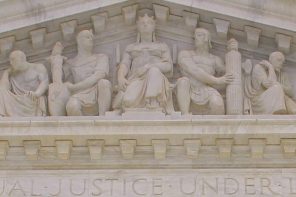In Albany, just before New York State voted to legalize gay marriage, a group of us met with the chief of staff for one of the swing-voting Republican Senators; the group included the pastor from the Riverside Church, the interim executive Presbyter, the director of the Association of Welcoming and Affirming Baptists (AWAB), Mormons for Gay rights, and a few others. We had our talking points in great shape.
Though bored, he listened. Then he asked for a “confidential” conversation; something off the record. Because we didn’t agree to that request, I can tell you about it. We didn’t need to agree, he burst out with his story anyway, disclosing himself as a Roman Catholic who thought marriage equality was a good idea. “Do you think I will go to hell because I think that?”
I quipped immediately, “I think you will go to hell if you don’t think that.” My colleagues kicked me under the table. I was off-message. One of them picked up where I fell down into my old punishmentalist materialism. You see, I was doing to him what he was doing to people who are gay. I was returning guilt for guilt.
A colleague saved me. “Tell me more,” said that pastor. Well, sure enough the staffer talked and talked and talked from a cavern of conscience, a stir toward the right thing, a willingness to admit that his religious background hadn’t prepared him for this work. While he was genuinely concerned about his afterlife, we were bugging him with talking points.
What is most pleasing about this victory in the battle for marriage equality, as the above story reveals, is the way it changed what many of us thought politics were. We’ve gone from the material to the cultural to the truth that The Story is stronger than The Argument. We are being led to a more spiritual version of politics—and shown how important religious education actually is. When we see God as gracious rather than punishing and communicate that to politicians, we will see progress on poverty, women’s rights, and a host of other issues.
So what lessons were learned? Chiefly, not to diminish another’s search for God, afterlife, and life. Another, be sure to thank Governor Andrew Cuomo and his domestic partner for showing us a new and winning strategy for justice. They are on the right track. And finally: let’s never forget the price of rent or the cost of gas while we also remember our sister, brother, cousin, and friend. In other words, cultural issues are not “better” than economic issues; nor vice versa. They are one and the same.
We’re in a new political era. Marriage equality did not happen in New York by the usual horse-trading, stealing money from tenants’ rights or exchanging limitations on taxing the wealthy. It happened because Governor Cuomo’s domestic partner helped him see that gay friends and family are more important than misguided theology. It happened because Catholic families called their electeds and their bishops and said, “whatever you do, make sure it doesn’t hurt my brother, cousin, aunt, or uncle.” In other words, family values made moral value a political matter.
The Senators, both Republican and Democrat, who “turned” in favor of the bill did so for moral matters, things that touched their hearts, loyalties, families, and friendships. We had long known that people care about the inner and the deep as much as they do about taxes. We’ve watched the Tea Party activate people against their own self-interests. We have even seen that some Republicans are willing to tank the economy just to win the next election. Why? Because they so deeply believe in what they think the Bible says.
Now that Republicans in New York have raised several billion dollars to defeat those who turned toward marriage equality, we see the strength of conscience again. They are not raising this money just out of cruelty, although cruelty is its consequence; they are raising this money out of their loyalties, values, and meanings.
We’re living through a change from the old overly materialist approach to politics, and emerging into a more spiritual, moral, conscience-driven ethos. In the UCC we’ve always done our politics this way—even though now and then we diverge—and are more than ready to understand how powerful the theological lever is. As the UCC declares, God is Still Speaking. And that theological statement matters more to the deportee, the down-and-out, and the gay 17-year-old who jumps off a bridge than any horse-trading we could ever do.
We still want to be smart about the material while being enchanted by the spiritual. We are not going back to the time when we converted people in the soup kitchen so they could eat (are you saved?) so much as we are going forward toward an opening levered by the Holy Spirit and drawing us more deeply toward justice. From that place, we don’t really care if we get reelected or not. Or at least we care less. Politics are changing—and once again we learn that the soul matters.



